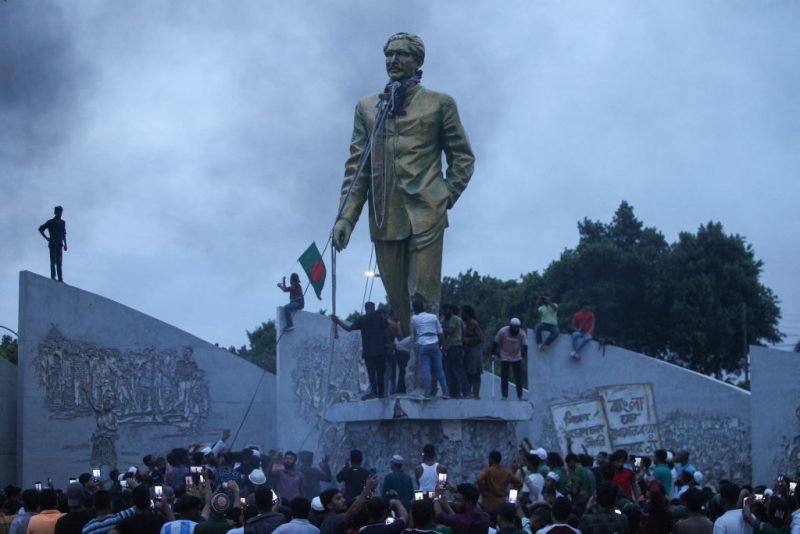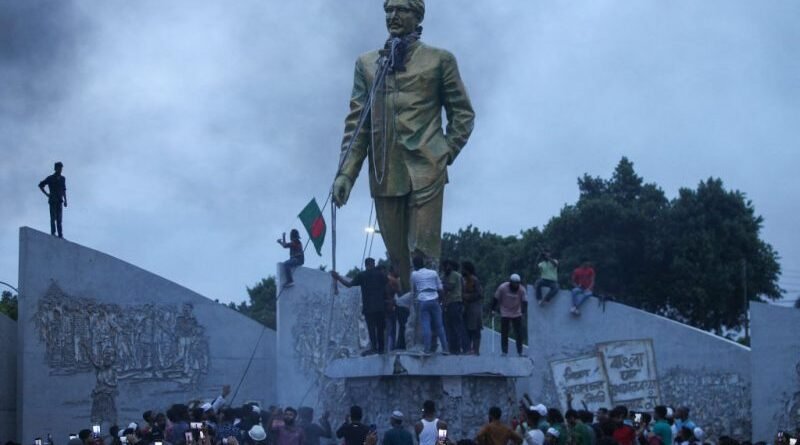Prime Minister of Bangladesh Steps Down and Leaves Country Following Weeks of Turbulent Demonstrations – One America News Network

OAN Staff James Meyers
10:02 AM – Monday, August 5, 2024
Bangladesh Prime Minister Sheikh Hasina’s 15-year rule ended after she resigned and fled the country on Monday due to protestors defying a military curfew to storm her official residence.
Advertisement
Furious protesters have been calling for her to step down.
The student-led protests saw nearly 100 people lose their life after clashing with police.
In an address to the nation, army chief General Waker-Uz-Zaman announced that an interim government would be formed and that every single death would be investigated.
“We will not achieve anything else through fighting and violence,” he said. “I urge you all to stop all conflicts and destruction. ”
Video footage circulating across social media showed protesters taking clothes and furniture out of the prime minister’s residence in the capital of Dhaka, which was left unguarded.
At least 95 people, including 14 police officers, were killed on Sunday amid fiery protests and riots that called for Hasina to step down, according to the country’s newspaper, Prothom Alo.
Additionally, Sunday had the highest death toll, since the protests first began in that same month after a preferential quota system for public sector jobs was released.
Over 200 people died and thousands were injured before even more violence took place on Sunday. Police shot out tear gas and rubber bullets as protesters set cars and buildings on fire.
“The shocking violence in Bangladesh must stop,” Volker Türk, the United Nations High Commissioner for Human Rights, said in a statement on Sunday.
Protesters planned for a march toward the nation’s capital on Monday, drawing participants from all around the country, in defiance of an indefinite statewide curfew that was enforced Sunday night. This event was described by internet monitoring firm Netblocks as “a near-total national internet shutdown.”
Internet services were back up later in the day.
“When you’re on the streets and you look around and see thousands of people of your age, your father’s age, your sister’s age, you feel invincible,” Monorom Polok, 25, said in a telephone interview from Dhaka.
In January, Hasina won a fourth straight term in an election that was called into question by her main opponents.
“Hasina has more recently been accused of vote-rigging, arresting opposition politicians, stifling press freedom and the forced disappearance of hundreds of dissidents, straining relations with the United States and other Western nations,” according to NBC News.
The assignment of government jobs is a serious topic in Bangladesh, with authorities struggling to limit inflation amid increasing poverty and a youth unemployment rate close to one-third of those in that category, according to the World Bank.
Government jobs are considered a pathway for a comfortable future for young people in Bangladesh, which could now be blocked by a quota system that Hasina was set to introduce.
After violent protests, the former system—which had set aside 30% of jobs for the families of individuals who had fought in Bangladesh’s 1971 independence war against Pakistan—was abandoned in 2018. The most recent demonstrations were sparked in June when a Bangladeshi court reinstated the quotas.
Stay informed! Receive breaking news blasts directly to your inbox for free. Subscribe here. https://www.oann.com/alerts
Advertisements below



